Values
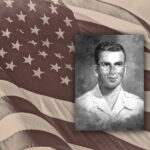 It’s hard to picture a dentist as being a hero, but US Army Medic Ben Salomon, who was a dentist before he was drafted in to the US Army as a private in 1940, as World War II was in its early stages. Salomon was assigned, not to the medical units, but rather, to the infantry. It was in the infantry during rifle and pistol qualifications that Salomon was rated an Expert Marksman. He also had medical knowledge that could be used during battlefield surgery. Salomon was assigned to a unit as their medic. Being a medic in wartime means that you are doing the noble thing, a task which is not often recognized as anything special. I think was have all seen the television show, MASH, in which the position of Army Doctor is viewed as mostly safe, far from the front lines, and given to a little bit of hanky panky. It doesn’t often paint a picture of heroic actions, although, sometimes the doctors are heroic (Nevertheless, I don’t mean to say that all military doctors are like the doctors on MASH, who are, after all, playing a part.) Medics serve and protect like every other serviceman, but they sometimes see a lot more of war’s ugly side. These unit medics might saw torn apart friends, horrific injuries, and a lot of deaths. The men they served with every day were their friends, and while the medic was usually behind the unit in a tent, caring for the wounded, these were not strangers to them. They were friends and comrades in arms.
It’s hard to picture a dentist as being a hero, but US Army Medic Ben Salomon, who was a dentist before he was drafted in to the US Army as a private in 1940, as World War II was in its early stages. Salomon was assigned, not to the medical units, but rather, to the infantry. It was in the infantry during rifle and pistol qualifications that Salomon was rated an Expert Marksman. He also had medical knowledge that could be used during battlefield surgery. Salomon was assigned to a unit as their medic. Being a medic in wartime means that you are doing the noble thing, a task which is not often recognized as anything special. I think was have all seen the television show, MASH, in which the position of Army Doctor is viewed as mostly safe, far from the front lines, and given to a little bit of hanky panky. It doesn’t often paint a picture of heroic actions, although, sometimes the doctors are heroic (Nevertheless, I don’t mean to say that all military doctors are like the doctors on MASH, who are, after all, playing a part.) Medics serve and protect like every other serviceman, but they sometimes see a lot more of war’s ugly side. These unit medics might saw torn apart friends, horrific injuries, and a lot of deaths. The men they served with every day were their friends, and while the medic was usually behind the unit in a tent, caring for the wounded, these were not strangers to them. They were friends and comrades in arms.
Just one month after Salomon’s promotion to captain, he experienced his first battle. Salomon volunteered to replace the 2nd Battalion, 105th Infantry Regiment’s field surgeon, who had been wounded. The unit was sent to Saipan to fight the Japanese forces. Little did Salomon know that this would be his only battle. When the unit landed in Saipan, they found immediately themselves in one of the most intense fights in the Pacific arena. Apparently this little island had been determined to be vital…no matter which side you were on. The Japanese army was not willing to concede the island and the US Army was adamant that they needed to take it. By the time Salomon’s unit arrived, the Japanese had taken the approach of advance and attack to their own deaths.
The tents for the field surgeons were located 50 yards behind the front, and it was there that Salomon worked to triage the severely wounded men. On July 6, 1944, the Japanese reached the trenches and Salomon’s position. Then on July 7th, the Japanese made it over the trenches and went straight to the medical tents. Inside, Salomon was treating wounded soldiers. He looked up and saw a Japanese soldier storm into the tent and bayonet one of the wounded and unarmed soldiers. Solomon acted instinctively. He grabbed an M1 rifle which was on a table close by and fired, killing the enemy soldier. For a medic, who never expected to need to fire his weapon, that situation must have come as a bit of a shock, but that soldier was not to be the only one Salomon killed that day. He turned back to the wounded soldiers, and then he saw two more enemy soldiers burst into the tent. There wasn’t much room in the tents, and they weren’t designed for hand to hand combat, but the tent soon became the battlefield, nevertheless. Salomon began swinging the rifle and clubbed the first soldier, then jamming the second with the butt of the weapon. Then, he shot one and bayoneted the other.
Immediately, four more Japanese soldiers made their way into the medical tent and tried to catch Salomon by surprise. One of the soldiers had a knife that Salomon kicked out of his hand before firing his rifle, killing one soldier and using his bayonet to kill another. By now, Salomon was out of bullets, so he picked up the knife and engaged with the two remaining enemy fighters. He killed one using the knife before head-butting the other, who was then shot by one of the patients in the tent. After dispatching the enemy soldiers, Salomon ordered his colleagues to evacuate the wounded. He would stay behind to hold off the enemy to give them the extra time they needed. As Captain Salomon loaded his rifle, the 30 wounded soldiers and orderlies in the tent started to retreat. The decision to stay and fight while the wounded were evacuated saved many lives, but Salomon was now in a battle that he had no hope of winning, much less living through. Ben Salomon made his last stand. He commandeered a heavy machine gun and was last seen firing at oncoming Japanese troops.
When the American troops were finally able to return to the area, they found Salomon’s body slumped over the machine gun, surrounded by the bodies of 98 Japanese soldiers. He had been shot 76 times and had 24 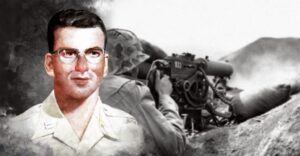 bayonet wounds on his body. Yes, Captain Salomon had died in the battle, but not before he killed 98 enemy soldiers, and the wounded soldiers and the medics with him had all managed to escape. Salomon was a serious force to be reckoned with, as the Japanese found out that day.
bayonet wounds on his body. Yes, Captain Salomon had died in the battle, but not before he killed 98 enemy soldiers, and the wounded soldiers and the medics with him had all managed to escape. Salomon was a serious force to be reckoned with, as the Japanese found out that day.
Medical personnel were considered ineligible for the Medal of Honor at that time, due to the terms of the Geneva Convention, so the request that he be awarded the medal was denied. After numerous other attempts over the years, Salomon’s bravery was finally recognized with the Medal of Honor in 2002, 58 years after his death.
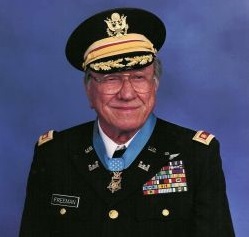
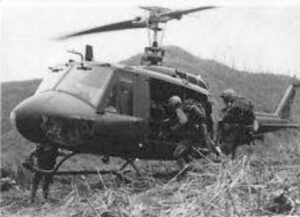 Ed Freeman first served in the military during World War II, in the United States Navy on the USS Cacapon (AO-52). While World War II was in no way uneventful or unimportant, it was not the most eventful part of Freeman’s service. Freeman decided to continue on in the military. Freeman had reached the rank of first sergeant by the time the Korean War began. By this time Freeman was in the Corps of Engineers, but his company fought as infantry soldiers in Korea. Freeman found himself fighting in the Battle of Pork Chop Hill, where he earned a battlefield commission as one of only 14 survivors out of 257 men who made it through the opening stages of the battle. His second lieutenant bars were pinned on by General James Van Fleet personally. He was given command of B Company and led them back up Pork Chop Hill.
Ed Freeman first served in the military during World War II, in the United States Navy on the USS Cacapon (AO-52). While World War II was in no way uneventful or unimportant, it was not the most eventful part of Freeman’s service. Freeman decided to continue on in the military. Freeman had reached the rank of first sergeant by the time the Korean War began. By this time Freeman was in the Corps of Engineers, but his company fought as infantry soldiers in Korea. Freeman found himself fighting in the Battle of Pork Chop Hill, where he earned a battlefield commission as one of only 14 survivors out of 257 men who made it through the opening stages of the battle. His second lieutenant bars were pinned on by General James Van Fleet personally. He was given command of B Company and led them back up Pork Chop Hill.
It was Freeman’s childhood dream to become a pilot, and his new commission made him eligible to become a pilot. Nevertheless, there was one drawback. When he applied for pilot training he was told that, at six feet four inches, he was “too tall” for pilot duty. That phrase stuck, and he became known as “Too Tall” for the rest of his career. It was a devastating setback, but in 1955, the height limit for pilots was raised and Freeman was finally accepted into flight school. He first flew fixed-wing army airplanes, but later switched to helicopters. When the Korean War ended, he flew the world on mapping missions.
By this time, Ed W. “Too Tall” Freeman had already had many success stories, but his real success story came during the Vietnam War, during the Battle of Ia Drang, specifically on November 14, 1965. During the battle, there were multiple men injured and the possibility of them dying was very real. Their unit was outnumbered 8-1 and the enemy fire on the men on the ground was so intense from 100 yards away, that the Commanding Officer ordered the MedEvac helicopters to stop coming in. That was basically a death sentence for the wounded men. The men were at LZ X-Ray, one of the most legendary war sites in Vietnam. It was here that the United States had its first major battle with the North Vietnamese People’s Army of Vietnam, the first very violent round of a bout that would last ten more years. There was really no way for the MedEvac helicopters to save them. Enter, Captain Ed Freeman, who was not a MedEvac pilot, by the way. Nevertheless, that did not stop him. He could not leave a man behind, much less 29 men. That this was not his job, meant nothing to Freeman, who heard the radio call and decided he was going to fly his Huey down into the machine gun fire anyway. He had not been given orders not to go, because he was not a MedEvac pilot, so he went. Those men soon knew that Captain Ed Freeman was coming in for them. Freeman dropped his Huey in and sat there in the machine gun fire, as they loaded 3 men at a time on board. Then, he flew up and out through the gunfire to get these men to the medical teams safety. And, he didn’t go in just once!! He kept going back…13 more times!! He went in until all the wounded were out. No one knew until the mission was over that the Captain had been hit 4 times in the legs and left arm.
Ed “Too Tall” Freeman was born on November 20, 1927 in Neely, Mississippi, the sixth of nine children. At the age of 13, he saw thousands of men on maneuvers pass by his home in Mississippi. He knew then that he wanted to become a soldier. Freeman grew up in nearby McLain, Mississippi, and graduated from Washington High School, however, at age 17, before graduating from high school, Freeman served in the United States Navy for two years. He then returned to his hometown and graduated from high school after the war. He joined the United States Army in September 1948, and married Barbara Morgan on April 30, 1955. They had two sons. Mike was born in 1956, and Doug was born in 1962.
Freeman’s commanding officer nominated him for the Medal of Honor for his actions at Ia Drang on November 14, 1965. Unfortunately, not in time to meet a two-year deadline in place at that time. He was instead awarded the Distinguished Flying Cross. The Medal of Honor nomination was disregarded until 1995, when the two-year 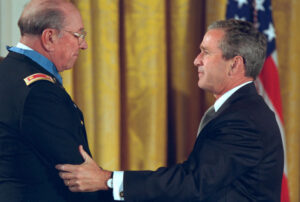
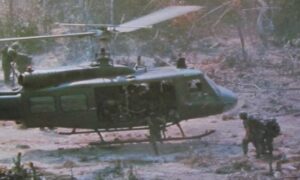 deadline was removed. He was finally and formally presented with the medal on July 16, 2001, in the East Room of the White House by President George W. Bush. Freeman died on August 20, 2008, due to complications from Parkinson’s disease. He was buried with full military honors at the Idaho State Veterans Cemetery in Boise.
deadline was removed. He was finally and formally presented with the medal on July 16, 2001, in the East Room of the White House by President George W. Bush. Freeman died on August 20, 2008, due to complications from Parkinson’s disease. He was buried with full military honors at the Idaho State Veterans Cemetery in Boise.
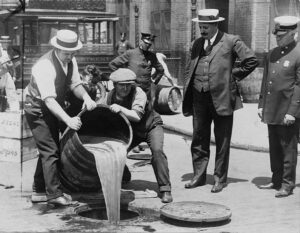 As many of us know, from history, there was a time in United States history when alcohol was illegal. Some will debate if it should still be today, but it is not. Prohibition, as it was called, ran from 1920 to 1933. Prohibition in the United States was a nationwide constitutional ban on the production, importation, transportation, and sale of alcoholic beverages. The Prohibitionists were led by pietistic Protestants. The idea was to heal what they saw as an ill society beset by alcohol-related problems such as alcoholism, family violence and saloon-based political corruption. There are many alcohol related issues that really do fall into these categories, but you can’t make people stop something that they are intent on doing. Drugs are the same, but we have to draw the line somewhere, or we will have a “zombieistic” society.
As many of us know, from history, there was a time in United States history when alcohol was illegal. Some will debate if it should still be today, but it is not. Prohibition, as it was called, ran from 1920 to 1933. Prohibition in the United States was a nationwide constitutional ban on the production, importation, transportation, and sale of alcoholic beverages. The Prohibitionists were led by pietistic Protestants. The idea was to heal what they saw as an ill society beset by alcohol-related problems such as alcoholism, family violence and saloon-based political corruption. There are many alcohol related issues that really do fall into these categories, but you can’t make people stop something that they are intent on doing. Drugs are the same, but we have to draw the line somewhere, or we will have a “zombieistic” society.
As Prohibition progressed, many communities introduced alcohol bans and enforcement of these new prohibition laws became a topic of debate. Prohibition supporters were called “Drys.” The “Drys” presented prohibition as a battle for public morals and health. The progressives, along with the Democratic and Republican parties picked up on the movement, and it gained a national grassroots base through the Woman’s Christian Temperance Union. After 1900, it was coordinated by the Anti-Saloon League. There were those who opposed Prohibition, including the beer industry, who mobilized “Wet” supporters from the wealthy Catholic and German Lutheran communities, but the influence of these groups receded from 1917 following the entry of the United States into the First World War against Germany.
By a succession of state legislatures, the alcohol industry was curtailed, and finally ended nationwide under the Eighteenth Amendment to the United States Constitution in 1920. The Eighteenth Amendment passed “with a 68 percent supermajority in the House of Representatives and 76 percent support in the Senate,” as well as ratification by 46 out of the 48 states we had at the time. That enabled legislation, known as the Volstead Act, which set down the rules for enforcing the federal ban and defined the types of alcoholic beverages that were prohibited. Unlike most people think, not all alcohol was banned. For example, religious use of wine was permitted. Private ownership and consumption of alcohol were not made illegal under federal law, but local laws were stricter in many areas, with some states banning possession outright.
With prohibition came the criminal element associated with a refusal to comply. Criminal gangs gained control of the beer and liquor supply in many cities. By the late 1920s, a new opposition to Prohibition emerged nationwide. Critics attacked the policy saying it was actually causing more crime, lowering local revenues, and imposing “rural” Protestant religious values on “urban” America. In another bizarre twist of Prohibition in the United States, the United States government literally decided that if people would not comply with the new law, they would make the penalty much stiffer. When the people continued to consume alcohol despite its being banned, law officials got frustrated and decided to try a different kind of deterrent…death. They literally ordered the poisoning of industrial alcohols manufactured in the United States. These were products regularly stolen by bootleggers to use is making moonshine. By the end of Prohibition in 1933, the federal poisoning program is estimated to have killed at least 10,000 people.
Prohibition ended with the ratification of the Twenty-first Amendment, which repealed the Eighteenth 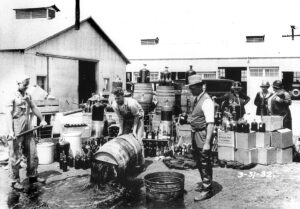 Amendment on December 5, 1933, though prohibition continued in some states. To date, this is the only time in American history in which a constitutional amendment was passed for the purpose of repealing another. Looking back on Prohibition, you will find researchers who say that alcohol consumption declined substantially due to Prohibition. They will also say that rates of liver cirrhosis, alcoholic psychosis, and infant mortality declined as well. Prohibition’s effect on rates of crime and violence is rather another story, because of the criminal element that made and sold alcohol in spite of the law. Nevertheless, Prohibition lost supporters every year it was in action, and lowered government tax revenues at a critical time before and during the Great Depression. I guys it all comes down to money in the end.
Amendment on December 5, 1933, though prohibition continued in some states. To date, this is the only time in American history in which a constitutional amendment was passed for the purpose of repealing another. Looking back on Prohibition, you will find researchers who say that alcohol consumption declined substantially due to Prohibition. They will also say that rates of liver cirrhosis, alcoholic psychosis, and infant mortality declined as well. Prohibition’s effect on rates of crime and violence is rather another story, because of the criminal element that made and sold alcohol in spite of the law. Nevertheless, Prohibition lost supporters every year it was in action, and lowered government tax revenues at a critical time before and during the Great Depression. I guys it all comes down to money in the end.
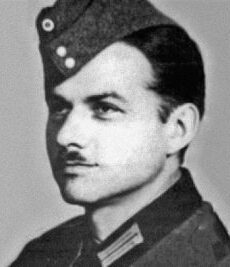
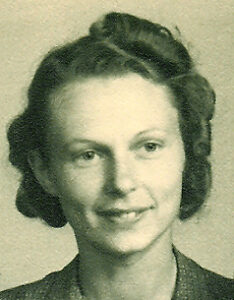 It seems highly unlikely that the United States would consider any of the German tactics from World War II to be useful or moral, but that is exactly what they thought of the Luftwaffe’s master interrogator, Hanns Scharff, whose interrogation tactic was…to be as nice as possible. Nice?? That word doesn’t really fit in with the picture most of us carry in our brain of the Nazi war machine. And even from what we see on television, interrogation is more of a verbally brutal assault on the senses, that breaks a person down so that they finally relent and give the interrogator the information they are asking for.
It seems highly unlikely that the United States would consider any of the German tactics from World War II to be useful or moral, but that is exactly what they thought of the Luftwaffe’s master interrogator, Hanns Scharff, whose interrogation tactic was…to be as nice as possible. Nice?? That word doesn’t really fit in with the picture most of us carry in our brain of the Nazi war machine. And even from what we see on television, interrogation is more of a verbally brutal assault on the senses, that breaks a person down so that they finally relent and give the interrogator the information they are asking for.
For getting information out of prisoners, Scharff’s best tactics included…nature walks without guards present, baking them homemade food, cracking jokes, drinking beers, and afternoon tea with German fighter aces. When I read that, I was totally stunned. Who would have ever considered such things to glean information out of a prisoner of war, or any kind of prisoner. Nevertheless, Scharff’s techniques were so successful that following World War II, the United States military incorporated his methods into their own interrogation schools.
Hanns-Joachim Gottlob Scharff was born on December 16, 1907 in Rastenburg, East Prussia, which is now K?trzyn, Poland, to Hans Hermann Scharf and Else Scharf (née Jahn). He was the second of three sons, the elder being Eberhardt and the younger, Wolfgang (who died in his teens). The last name was originally Scharf, but Hanns Scharff added an extra ‘f’ to the end of his last name as an adult, because some ancestors spelled their last names that way, and he thought it might be the correct spelling, which is something I have come across in my own family research as well.
Scharff was nicknamed the “Master Interrogator” of the Luftwaffe, and possibly of all Nazi Germany. he has also been praised for his contribution in shaping US interrogation techniques after the war. As an Obergefreiter…basically a Private First Class, he was charged with interrogating captured American fighter pilots, becoming an interrogation officer in 1943. He has been highly praised for the success of his techniques, in particular because he never used physical means to obtain the required information. Scharff’s interrogation techniques were so effective that he was occasionally called upon to assist other German interrogators in their questioning of bomber pilots and aircrews, including those crews and fighter pilots from countries other than the United States. Additionally, he was charged with questioning many more important prisoners who were funneled through the interrogation center, such as senior officers and famous fighter aces. I am not saying that because of this man’s techniques, all captured airmen gave up the information, just that what information they gave was not beaten out of them.
While training in the family business, and on a business trip to South Africa, Scharff met and married a South African British woman named Margaret Stokes. Margaret was the daughter of Captain Claud Stokes, first a pilot in Rhodesia in 1913, and later a squadron leader in the Royal Flying Corps. In 1939, the couple and their children went back to Germany for a vacation when WWII broke out. So now they were stuck. Scharff, was a German citizen, which put him in the army. While being drafted was not what they wanted, it did change who Scharff was…forever.
In 1948, Scharff was invited by the United States Air Force to give lectures on his interrogation techniques and first-hand experiences. The US military later incorporated his methods into its curriculum at its interrogation schools. Many of his methods are still taught in US Army interrogation schools. Scharff was granted immigration status. From the 1950s until his death on September 10, 1992, Scharff decided that he wanted to have a more gentle life, so he redirected his efforts to the creation of mosaics. He became a world-renowned 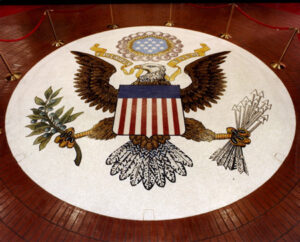
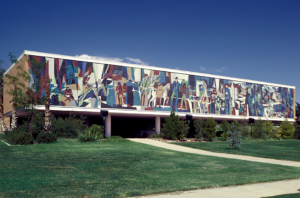 mosaic artisan, with his handiwork on display in locations worldwide, like the California State Capitol building; Los Angeles City Hall; several schools, colleges, and universities, including the giant Outdoor Mosaic Mural facade of the Dixie State College; Fine Arts Center; Epcot Center; and in the 15-foot arched mosaic walls featuring the story of Cinderella; Cinderella Castle; Walt Disney World, Florida.
mosaic artisan, with his handiwork on display in locations worldwide, like the California State Capitol building; Los Angeles City Hall; several schools, colleges, and universities, including the giant Outdoor Mosaic Mural facade of the Dixie State College; Fine Arts Center; Epcot Center; and in the 15-foot arched mosaic walls featuring the story of Cinderella; Cinderella Castle; Walt Disney World, Florida.
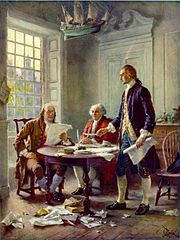 When the British Colonies, also known as the Thirteen Colonies or the early United States, were founded in the 1600s, the colonies were left to govern themselves for the most part. The land was really an expansion of power for Britain. Nevertheless, there were wars that took place in the new land and with them the costs of war, and because the colonies were owned by the British government, the cost of war fell on them. The cost of victory in the 1754 to 1763 French and Indian War and the 1756 to 1763 Seven Years’ War left the British government deeply in debt. The wars were fought in the colonies, but were equipped and populated with the British forces stationed there, at the cost of millions of British funds. The British government decided to impose The Stamp Act and Townshend Acts to pay for the wars, which provoked colonial opposition and unrest, leading to the 1770 Boston Massacre and 1773 Boston Tea Party. Then, came the Intolerable Acts, meant to punish the Massachusetts colonists for their defiance in the Tea Party protest in reaction to changes in taxation by the British Government, in spring 1774 upon Massachusetts. It was enough. These acts took away self-governance and rights that Massachusetts had enjoyed since its founding, and triggered outrage and indignation in the Thirteen Colonies, and twelve colonies sent delegates to the First Continental Congress, from September 5, 1774 to October 26, 1774. Their goal was to draft a petition to the King and organize a boycott of British goods. It was these acts…the acts that took away self-governance and other rights that triggered outrage and indignation in the Thirteen Colonies. We have often heard it called “taxation without representation” and it would never be tolerated. This nation had tasted freedom, and would never go back. These acts were key developments in the outbreak of the American Revolutionary War in April 1775.
When the British Colonies, also known as the Thirteen Colonies or the early United States, were founded in the 1600s, the colonies were left to govern themselves for the most part. The land was really an expansion of power for Britain. Nevertheless, there were wars that took place in the new land and with them the costs of war, and because the colonies were owned by the British government, the cost of war fell on them. The cost of victory in the 1754 to 1763 French and Indian War and the 1756 to 1763 Seven Years’ War left the British government deeply in debt. The wars were fought in the colonies, but were equipped and populated with the British forces stationed there, at the cost of millions of British funds. The British government decided to impose The Stamp Act and Townshend Acts to pay for the wars, which provoked colonial opposition and unrest, leading to the 1770 Boston Massacre and 1773 Boston Tea Party. Then, came the Intolerable Acts, meant to punish the Massachusetts colonists for their defiance in the Tea Party protest in reaction to changes in taxation by the British Government, in spring 1774 upon Massachusetts. It was enough. These acts took away self-governance and rights that Massachusetts had enjoyed since its founding, and triggered outrage and indignation in the Thirteen Colonies, and twelve colonies sent delegates to the First Continental Congress, from September 5, 1774 to October 26, 1774. Their goal was to draft a petition to the King and organize a boycott of British goods. It was these acts…the acts that took away self-governance and other rights that triggered outrage and indignation in the Thirteen Colonies. We have often heard it called “taxation without representation” and it would never be tolerated. This nation had tasted freedom, and would never go back. These acts were key developments in the outbreak of the American Revolutionary War in April 1775.
The Revolutionary War was not going to be a short war. It would rage from April 19, 1775 to September 3, 1783…eight long years. For seven years after the United States Declaration of Independence was adopted by the Second Continental Congress at its meeting in Philadelphia, Pennsylvania, on July 4, 1776, the war still raged on. I don’t suppose any nation would want to simply lay down its control, but the reality is that Britain had lost its control many years before, and it was time to cut their losses and go home.
It was on June 11, 1776, that the Continental Congress made the decision and selected Thomas Jefferson of Virginia, John Adams of Massachusetts, Benjamin Franklin of Pennsylvania, Roger Sherman of Connecticut and Robert R. Livingston of New York to draft our Declaration of Independence. That moment truly sealed the fate of the Britain ownership of this nation. The words they penned would be taught in schools, put on documents, t-shirts, decals, and many other forms of media. Because John Adams knew of Thomas Jefferson’s prowess with a pen, he urged him to author the first draft of the document, which was then carefully revised by Adams and Franklin before being given to Congress for review on June 28. I don’t know how many have ever read the entire Declaration of Independence, but I have chosen to place it in its unedited entirety, because I think we need to know why our founding fathers fought so hard for our independence. The 4th of July is not about picnics and fireworks, it is about freedom, and we must never forget that…nor the five men who wrote it and the entire congress who signed it.
The Declaration of Independence
“When in the Course of human events, it becomes necessary for one people to dissolve the political bands which have connected them with another, and to assume among the powers of the earth, the separate and equal station to which the Laws of Nature and of Nature’s God entitle them, a decent respect to the opinions of mankind requires that they should declare the causes which impel them to the separation.
We hold these truths to be self-evident, that all men are created equal, that they are endowed by their Creator with certain unalienable Rights, that among these are Life, Liberty and the pursuit of Happiness.–That to secure these rights, Governments are instituted among Men, deriving their just powers from the consent of the governed, –That whenever any Form of Government becomes destructive of these ends, it is the Right of the People to alter or to abolish it, and to institute new Government, laying its foundation on such principles and organizing its powers in such form, as to them shall seem most likely to effect their Safety and Happiness. Prudence, indeed, will dictate that Governments long established should not be changed for light and transient causes; and accordingly all experience hath shewn, that mankind are more disposed to suffer, while evils are sufferable, than to right themselves by abolishing the forms to which they are accustomed. But when a long train of abuses and usurpations, pursuing invariably the same Object evinces a design to reduce them under absolute Despotism, it is their right, it is their duty, to throw off such Government, and to provide new Guards for their future security.–Such has been the patient sufferance of these Colonies; and such is now the necessity which constrains them to alter their former Systems of Government. The history of the present King of Great Britain is a history of repeated injuries and usurpations, all having in direct object the establishment of an absolute Tyranny over these States. To prove this, let Facts be submitted to a candid world.
He has refused his Assent to Laws, the most wholesome and necessary for the public good.
He has forbidden his Governors to pass Laws of immediate and pressing importance, unless suspended in their operation till his Assent should be obtained; and when so suspended, he has utterly neglected to attend to them.
He has refused to pass other Laws for the accommodation of large districts of people, unless those people would relinquish the right of Representation in the Legislature, a right inestimable to them and formidable to tyrants only.
He has called together legislative bodies at places unusual, uncomfortable, and distant from the depository of their public Records, for the sole purpose of fatiguing them into compliance with his measures.
He has dissolved Representative Houses repeatedly, for opposing with manly firmness his invasions on the rights of the people.
He has refused for a long time, after such dissolutions, to cause others to be elected; whereby the Legislative powers, incapable of Annihilation, have returned to the People at large for their exercise; the State remaining in the mean time exposed to all the dangers of invasion from without, and convulsions within.
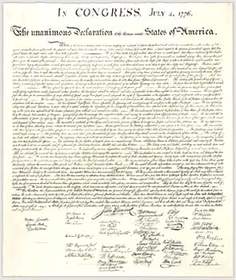
He has endeavoured to prevent the population of these States; for that purpose obstructing the Laws for Naturalization of Foreigners; refusing to pass others to encourage their migrations hither, and raising the conditions of new Appropriations of Lands.
He has obstructed the Administration of Justice, by refusing his Assent to Laws for establishing Judiciary powers.
He has made Judges dependent on his Will alone, for the tenure of their offices, and the amount and payment of their salaries.
He has erected a multitude of New Offices, and sent hither swarms of Officers to harrass our people, and eat out their substance.
He has kept among us, in times of peace, Standing Armies without the Consent of our legislatures.
He has affected to render the Military independent of and superior to the Civil power.
He has combined with others to subject us to a jurisdiction foreign to our constitution, and unacknowledged by our laws; giving his Assent to their Acts of pretended Legislation:
For Quartering large bodies of armed troops among us:
For protecting them, by a mock Trial, from punishment for any Murders which they should commit on the Inhabitants of these States:
For cutting off our Trade with all parts of the world:
For imposing Taxes on us without our Consent:
For depriving us in many cases, of the benefits of Trial by Jury:
For transporting us beyond Seas to be tried for pretended offences
For abolishing the free System of English Laws in a neighbouring Province, establishing therein an Arbitrary government, and enlarging its Boundaries so as to render it at once an example and fit instrument for introducing the same absolute rule into these Colonies:
For taking away our Charters, abolishing our most valuable Laws, and altering fundamentally the Forms of our Governments:
For suspending our own Legislatures, and declaring themselves invested with power to legislate for us in all cases whatsoever.
He has abdicated Government here, by declaring us out of his Protection and waging War against us.
He has plundered our seas, ravaged our Coasts, burnt our towns, and destroyed the lives of our people.
He is at this time transporting large Armies of foreign Mercenaries to compleat the works of death, desolation and tyranny, already begun with circumstances of Cruelty & perfidy scarcely paralleled in the most barbarous ages, and totally unworthy the Head of a civilized nation.
He has constrained our fellow Citizens taken Captive on the high Seas to bear Arms against their Country, to become the executioners of their friends and Brethren, or to fall themselves by their Hands.
He has excited domestic insurrections amongst us, and has endeavoured to bring on the inhabitants of our frontiers, the merciless Indian Savages, whose known rule of warfare, is an undistinguished destruction of all ages, sexes and conditions.
In every stage of these Oppressions We have Petitioned for Redress in the most humble terms: Our repeated Petitions have been answered only by repeated injury. A Prince whose character is thus marked by every act which may define a Tyrant, is unfit to be the ruler of a free people.
Nor have We been wanting in attentions to our Brittish brethren. We have warned them from time to time of attempts by their legislature to extend an unwarrantable jurisdiction over us. We have reminded them of the circumstances of our emigration and settlement here. We have appealed to their native justice and magnanimity, and we have conjured them by the ties of our common kindred to disavow these usurpations, which, would inevitably interrupt our connections and correspondence. They too have been deaf to the voice of justice and of consanguinity. We must, therefore, acquiesce in the necessity, which denounces our Separation, and hold them, as we hold the rest of mankind, Enemies in War, in Peace Friends.
We, therefore, the Representatives of the united States of America, in General Congress, Assembled, appealing to the Supreme Judge of the world for the rectitude of our intentions, do, in the Name, and by Authority of the good People of these Colonies, solemnly publish and declare, That these United Colonies are, and of Right  ought to be Free and Independent States; that they are Absolved from all Allegiance to the British Crown, and that all political connection between them and the State of Great Britain, is and ought to be totally dissolved; and that as Free and Independent States, they have full Power to levy War, conclude Peace, contract Alliances, establish Commerce, and to do all other Acts and Things which Independent States may of right do. And for the support of this Declaration, with a firm reliance on the protection of divine Providence, we mutually pledge to each other our Lives, our Fortunes and our sacred Honor.”
ought to be Free and Independent States; that they are Absolved from all Allegiance to the British Crown, and that all political connection between them and the State of Great Britain, is and ought to be totally dissolved; and that as Free and Independent States, they have full Power to levy War, conclude Peace, contract Alliances, establish Commerce, and to do all other Acts and Things which Independent States may of right do. And for the support of this Declaration, with a firm reliance on the protection of divine Providence, we mutually pledge to each other our Lives, our Fortunes and our sacred Honor.”

 My grand-nephew, Xander Spethman is the eldest child of my niece, Jenny Spethman and her husband, Steve. Xander takes his job as older brother very seriously. He understands that as the older brother, he has a responsibility to be a leader for his younger siblings. They look up to Xander, as do Xander’s friends. He really is a leader, and he takes that seriously. When Xander and his siblings, Zack, Isaac, and Aleesia are playing, Xander (and his brothers too) always make sure that Aleesia wins the games. She is the youngest, and younger by a few extra years, due to the passing of their sister, Laila less than a month after her birth. The boys are very protective of their sisters. In their playtime, Xander is the leader of the pack, so to speak. In group situations, Xander leads and the rest follow his lead. The younger boys look up their brother, especially in the area of how they should act. Xander makes sure that he leads by example…and always a good example. Xander is a great big brother.
My grand-nephew, Xander Spethman is the eldest child of my niece, Jenny Spethman and her husband, Steve. Xander takes his job as older brother very seriously. He understands that as the older brother, he has a responsibility to be a leader for his younger siblings. They look up to Xander, as do Xander’s friends. He really is a leader, and he takes that seriously. When Xander and his siblings, Zack, Isaac, and Aleesia are playing, Xander (and his brothers too) always make sure that Aleesia wins the games. She is the youngest, and younger by a few extra years, due to the passing of their sister, Laila less than a month after her birth. The boys are very protective of their sisters. In their playtime, Xander is the leader of the pack, so to speak. In group situations, Xander leads and the rest follow his lead. The younger boys look up their brother, especially in the area of how they should act. Xander makes sure that he leads by example…and always a good example. Xander is a great big brother.
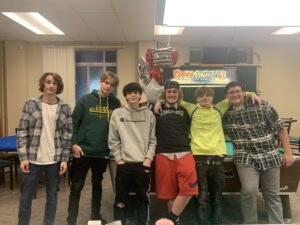
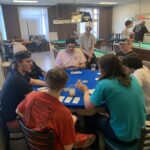 Xander has always had a lot of friends. Part of his charm is that he treats others in the way he would like to be treated. More people need to learn to live by that rule. High school is not the easiest place to be, but Xander is good and kind, and while that doesn’t always protect him from the rudeness around him, it always makes those who know Xander proud to know him. Xander doesn’t participate in the rude pranks or comments of those around him. He is far too mature for the childness of some people, and that is something to be proud of. This year, Xander met a wonderful girl named Alli Simpson. They are so good for each other. They went to prom, and they looked so cute. Alli fits well in the Spethman family, and while they are young and in no hurry, they are very much loving their time together. Xander has fallen in love with Alli, and the family couldn’t be happier.
Xander has always had a lot of friends. Part of his charm is that he treats others in the way he would like to be treated. More people need to learn to live by that rule. High school is not the easiest place to be, but Xander is good and kind, and while that doesn’t always protect him from the rudeness around him, it always makes those who know Xander proud to know him. Xander doesn’t participate in the rude pranks or comments of those around him. He is far too mature for the childness of some people, and that is something to be proud of. This year, Xander met a wonderful girl named Alli Simpson. They are so good for each other. They went to prom, and they looked so cute. Alli fits well in the Spethman family, and while they are young and in no hurry, they are very much loving their time together. Xander has fallen in love with Alli, and the family couldn’t be happier.
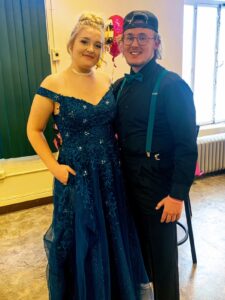
 As Xander heads into his senior year of high school, his mom is starting to feel a little sad, because time always goes by so fast. Here they were, just living their life, and now…suddenly, Xander’s childhood years are almost over. Jenny and Steve rely on Xander, and they trust him. They know that he is honorable and truthful. Now, he is busy planning his future, and is considering going to trade school to become an electrician. Jenny says, “Is so hard for me to think about him leaving my house. I have tried to enjoy every moment with him.” That’s all a parent can do, and it won’t be the same once he moves out, Xander will come home for visits often, because that is where his heart is. Today is Xander’s 18th birthday. Happy birthday Xander!! Have a great day!! We love you!!
As Xander heads into his senior year of high school, his mom is starting to feel a little sad, because time always goes by so fast. Here they were, just living their life, and now…suddenly, Xander’s childhood years are almost over. Jenny and Steve rely on Xander, and they trust him. They know that he is honorable and truthful. Now, he is busy planning his future, and is considering going to trade school to become an electrician. Jenny says, “Is so hard for me to think about him leaving my house. I have tried to enjoy every moment with him.” That’s all a parent can do, and it won’t be the same once he moves out, Xander will come home for visits often, because that is where his heart is. Today is Xander’s 18th birthday. Happy birthday Xander!! Have a great day!! We love you!!
 Since man had power on the earth, man has also had power outages. Power outages are one thing, but rolling blackouts are another thing altogether. “A rolling blackout, also known as rotational load shedding, feeder rotation, or a rotating outage is an intentionally-engineered electrical power shutdown in which electricity delivery is stopped for non-overlapping periods of time over different parts of the distribution region.” This type of shutdown…rolling blackouts…are a supposed to be a last-resort measure used by an electric utility company to avoid a total blackout of the power system. I can understand that in a serious heat wave, even though it is a dangerous maneuver, and I can even understand it in an overload caused by an unexpected cold snap, even thought that is also seriously dangerous.
Since man had power on the earth, man has also had power outages. Power outages are one thing, but rolling blackouts are another thing altogether. “A rolling blackout, also known as rotational load shedding, feeder rotation, or a rotating outage is an intentionally-engineered electrical power shutdown in which electricity delivery is stopped for non-overlapping periods of time over different parts of the distribution region.” This type of shutdown…rolling blackouts…are a supposed to be a last-resort measure used by an electric utility company to avoid a total blackout of the power system. I can understand that in a serious heat wave, even though it is a dangerous maneuver, and I can even understand it in an overload caused by an unexpected cold snap, even thought that is also seriously dangerous.
I don’t know a lot about the energy industry, but I do know that some of the recent cuts in types of energy resources are very dangerous when it comes to making sure that we have enough energy for our country. It  seems that these states who don’t regularly need large amounts of energy for heating and cooling, don’t have a way to “stockpile” any either. Rolling blackouts are used as a response strategy to cope with reduced output beyond reserve capacity from power stations taken offline unexpectedly, such as an extreme weather event. So, when an emergency occurs, their solution is to have these rolling blackouts. California has done this for years.
seems that these states who don’t regularly need large amounts of energy for heating and cooling, don’t have a way to “stockpile” any either. Rolling blackouts are used as a response strategy to cope with reduced output beyond reserve capacity from power stations taken offline unexpectedly, such as an extreme weather event. So, when an emergency occurs, their solution is to have these rolling blackouts. California has done this for years.
The theory behind the rolling blackouts is a “measure of demand” response. If the demand for electricity exceeds the power supply capability of the network, it’s time to have a planned blackout. Rolling blackouts might be limited to a single city or state, or they can be district or nationwide. The whole thing depends on the network and the stockpile of energy resources. Rolling blackouts generally result from two causes. These are insufficient generation capacity or inadequate transmission infrastructure to deliver power to where it is needed.
For California the rolling blackouts had began on June 14th, 2000 due to a heatwave. Other dates for rolling blackouts in those first couple of years were January 17-18, 2001, March 19-20, 2001, and May 7-8, 2001. These were the beginning dates of the California electricity crisis which included extremely high prices and  rolling blackouts. In reality, the “crisis” was a direct result from the manipulation of energy of a partially deregulated California energy system by companies like Enron and Reliant Energy. I wonder too, if the mismanagement wasn’t also on the part of the state’s mismanagement. The recent power outages in Texas from the freezing weather were also rolling blackouts, and the problems they caused were far worse than the California rolling blackouts, because of all the things that froze up from the severe cold. The reality is that one way or the other, our government has to stop limiting the production of our energy resources. That is my opinion, and I’m sure some would disagree, but these rolling blackouts are ridiculous.
rolling blackouts. In reality, the “crisis” was a direct result from the manipulation of energy of a partially deregulated California energy system by companies like Enron and Reliant Energy. I wonder too, if the mismanagement wasn’t also on the part of the state’s mismanagement. The recent power outages in Texas from the freezing weather were also rolling blackouts, and the problems they caused were far worse than the California rolling blackouts, because of all the things that froze up from the severe cold. The reality is that one way or the other, our government has to stop limiting the production of our energy resources. That is my opinion, and I’m sure some would disagree, but these rolling blackouts are ridiculous.
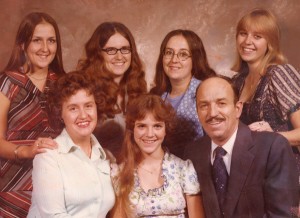
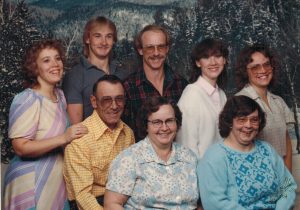 Have you ever wondered what things you might change if you could just turn back time? I can think of a number of things I would change, and I can think of many things that I would never change too. Things like my husband, children, grandchildren, and great grandchildren are definitely in the “I wouldn’t change these things at all” category. My religious beliefs and career choices fall in that category as well. I have lived a blessed life. Of that fact there is not doubt. I had wonderful parents and in-laws, as well as sisters, sisters-in-law and brothers-in-law, nieces, and nephews too. My aunts, uncles, and cousins are precious to me. Yes, I have been greatly blessed. In these things, I would never choose to turn back time.
Have you ever wondered what things you might change if you could just turn back time? I can think of a number of things I would change, and I can think of many things that I would never change too. Things like my husband, children, grandchildren, and great grandchildren are definitely in the “I wouldn’t change these things at all” category. My religious beliefs and career choices fall in that category as well. I have lived a blessed life. Of that fact there is not doubt. I had wonderful parents and in-laws, as well as sisters, sisters-in-law and brothers-in-law, nieces, and nephews too. My aunts, uncles, and cousins are precious to me. Yes, I have been greatly blessed. In these things, I would never choose to turn back time.
Of course, we have all made mistakes in life. I think the ones that tend to haunt us the most are the things we didn’t say, when we could have. Or we might regret the things we did say, when we might have kept quiet, or said something different. Also, we might regret the time we might have spent with those we care about, but we allowed our busy lives to dictate our time, or the lack thereof. When it pertains to those we love, like parents, grandparents, aunts, or uncles, we all have wished that we had spent more time. Of course, as kids, and even as adults, there always seemed to be more time for these things later…until there wasn’t. When they are gone, we finally see just how unimportant that important thing we needed to do, really was. Of course, communication goes both ways, but some people really warrant an extra effort. Unfortunately, they don’t always let us know that they needed more of our time. They don’t want to intrude, I suppose.
If I could turn back time, I would go see my parents and in-laws more than I did. I would call and talk to siblings, siblings-in-law, nieces, nephews, aunts, uncles, and cousins more. I have found that for those who are online, Facebook, texting, and Messenger have helped to fill the gaps. For me, it is far easier to text or write things down, because believe it or not, I am a bashful person. I can carry on a conversation, however, and I 
 really should do that, so I don’t regret still another “shoulda, woulda, coulda” later in my life. I guess what I am getting at is that we all need to consider the things that are important to us, and make sure that we pay those important things enough attention. That way, maybe, “If I could turn back time” could be just another song lyrics, and not a personal regret.
really should do that, so I don’t regret still another “shoulda, woulda, coulda” later in my life. I guess what I am getting at is that we all need to consider the things that are important to us, and make sure that we pay those important things enough attention. That way, maybe, “If I could turn back time” could be just another song lyrics, and not a personal regret.
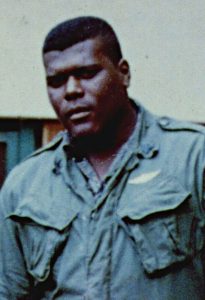 Combat diving…yes, that’s a real thing. Navy divers are used in ships maintenance, marine construction and salvage, demolition and mine clearance, and special forces. Army divers may be used in engineering activities such as bridge construction and demolition, and by special forces units. I guess that when I considered combat diving, I thought of underwater battles, and once in a while, that was the case. One case I heard of recently is that of Robert Hughes. Sergeant Hughes served as the Dive NCO for First Force Recon Company during 1967 to 1968. Born September 26, 1951, Hughes grew into a tall muscular man, and that helped him in the performance of his duties. During the Vietnam War, it seems that while divers had jobs to do routinely below the surface of the water, the Vietcong had a tendency to try to sabotage the divers, and that’s when they knew what real combat diving was.
Combat diving…yes, that’s a real thing. Navy divers are used in ships maintenance, marine construction and salvage, demolition and mine clearance, and special forces. Army divers may be used in engineering activities such as bridge construction and demolition, and by special forces units. I guess that when I considered combat diving, I thought of underwater battles, and once in a while, that was the case. One case I heard of recently is that of Robert Hughes. Sergeant Hughes served as the Dive NCO for First Force Recon Company during 1967 to 1968. Born September 26, 1951, Hughes grew into a tall muscular man, and that helped him in the performance of his duties. During the Vietnam War, it seems that while divers had jobs to do routinely below the surface of the water, the Vietcong had a tendency to try to sabotage the divers, and that’s when they knew what real combat diving was.
While hunting the Vietcong fighters, it was not uncommon for US troops to observe the Vietnamese flee underwater and never reemerge. It was proof that they had made their escape into one of the countless tunnel entrances located below the water. The US had scuba trained Force Recon Marines, who would comb the river bed looking for bodies, equipment caches, or 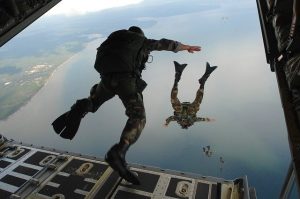 enemy tunnels. It was during one such mission that Hughes fought the battle that would earn him his reputation.
enemy tunnels. It was during one such mission that Hughes fought the battle that would earn him his reputation.
Hughes had always been called a “gentle giant” by the Marines he served with. Of course, it was his size that earned him the giant part…Hughes towered over many of his peers. He was a gentle man, but all that disappeared when he was engaged in a battle with the VC fighters. Then he became a virtual tiger. On one dive mission, Hughes was given the task of locating an underwater tunnel. He was searching through the murky darkness. As he felt his way along a bank with one hand, Kabar knife ready in the other. He located what appeared to be the tunnel entrance, and suddenly an enemy diver shot out of the hole. A fierce battle ensued. It was a fight for his life. Hughes knew that he had to kill or be killed. Submerged and hampered by limited visibility, Hughes fought to get control of 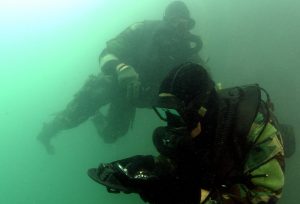 his enemy. Finally, he gained the upper hand. Hughes wrapped his legs around his enemy and pulled him in close. Then he spit out his regulator, lunged forward, and bit into the diver’s throat, ripping it out. The diver released his grip and Hughes finished the fight. This wasn’t the only “kill” to Hughes’ credit, but it was quite possible the most dramatic. Not many people have fought to the death by ripping out the throat of their enemy with their teeth. Hughes was a tiger in battle. One marine who served with him, said, “There was no one I would rather have as security underwater than Sergeant Hughes.” Hughes was an amazing soldier. Sergeant Robert “Gentle Giant” Hughes died on February 14, 1990.
his enemy. Finally, he gained the upper hand. Hughes wrapped his legs around his enemy and pulled him in close. Then he spit out his regulator, lunged forward, and bit into the diver’s throat, ripping it out. The diver released his grip and Hughes finished the fight. This wasn’t the only “kill” to Hughes’ credit, but it was quite possible the most dramatic. Not many people have fought to the death by ripping out the throat of their enemy with their teeth. Hughes was a tiger in battle. One marine who served with him, said, “There was no one I would rather have as security underwater than Sergeant Hughes.” Hughes was an amazing soldier. Sergeant Robert “Gentle Giant” Hughes died on February 14, 1990.
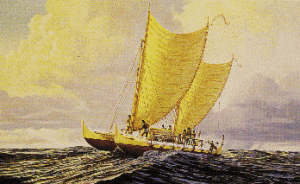
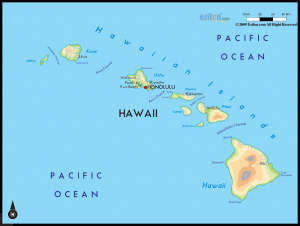 As the world first began to be settled, the Hawaiian Islands were discovered, and in approximately 400AD Polynesians from the Marquesas Islands traveled the 2000 miles distance to Hawaii’s Big Island in canoes. To get to Hawaii, they navigated by the sun and stars, reading the winds, currents, and seabirds’ flight. The Polynesians sailed across the open ocean in great double-hulled canoes. The Polynesians brought with them items essential to their survival, including pigs, dogs, and chickens; the roots of kalo (a root vegetable and one of the most complex carbohydrates on the planet) and sweet potato; the seeds and saplings of coconut, banana, sugar cane, and other edible and medicinal plants. Polynesians were well-established on the islands when Polynesians from the Society Islands arrived in Hawaii. These newcomers became the new rulers of Hawaii. After a time of voyaging back and forth between the Society Islands and the Hawaiian Archipelago, contact with southern Polynesia ceased. During the 400 years of isolation that followed, a unique Hawaiian culture developed. That is similar to what happened when the pilgrims came to the new world…present-day United States. Once away from the culture one comes from, new ideas and new skills begin to form.
As the world first began to be settled, the Hawaiian Islands were discovered, and in approximately 400AD Polynesians from the Marquesas Islands traveled the 2000 miles distance to Hawaii’s Big Island in canoes. To get to Hawaii, they navigated by the sun and stars, reading the winds, currents, and seabirds’ flight. The Polynesians sailed across the open ocean in great double-hulled canoes. The Polynesians brought with them items essential to their survival, including pigs, dogs, and chickens; the roots of kalo (a root vegetable and one of the most complex carbohydrates on the planet) and sweet potato; the seeds and saplings of coconut, banana, sugar cane, and other edible and medicinal plants. Polynesians were well-established on the islands when Polynesians from the Society Islands arrived in Hawaii. These newcomers became the new rulers of Hawaii. After a time of voyaging back and forth between the Society Islands and the Hawaiian Archipelago, contact with southern Polynesia ceased. During the 400 years of isolation that followed, a unique Hawaiian culture developed. That is similar to what happened when the pilgrims came to the new world…present-day United States. Once away from the culture one comes from, new ideas and new skills begin to form.
The Hawaiian people were highly skilled farmers and fishermen, who lived in small communities ruled by chieftains who battled one another for territory. The new Hawaiian culture was a highly stratified society with strictly maintained classes of people. The chiefs headed the social pyramid and ruled over the land. The highest class, the Kahuna (professionals) were highly regarded and sometimes feared, they were experts on religious ritual or specialists in canoe-building, herbal medicine, and healing. The middle class, the maka`ainana (commoners) farmed, fished, built walls, houses, and fishponds…and paid taxes to the paramount chiefs and his chiefs. Kauwa, the lowest class, were outcasts or slaves. I can’t say that the class society was fair, because it really wasn’t, but many societies of that era were ruled in that way, and in reality, this class society still exists…maybe with slight differences, but it still exists.
In many ways, the culture was quite oppressive, especially to women. A system of laws known as Kanawai enforced Hawaii’s social order. Certain people, places, things, and times were considered sacred. Being near them was kapu, or forbidden except to a very privileged few. Women ate apart from men and were restricted from eating pork, coconuts, bananas, or a variety of other foods. Kapu regulated fishing, planting, and the harvesting of other resources, thus ensuring their conservation. Any breaking of kapu disturbed the stability of society, and the punishment for breaking this law was usually death.
Still, even with the strict laws, village life was rich and interesting. Hawaiians fished in coastal waters and collected shellfish, seaweed, and salt along the shore. They raised pigs, dogs, and chickens and harvested sweet potatoes, kalo, and other crops. Men pounded kalo into poi, which is the staple food of Hawaiians, while women beat the inner bark of wauke (paper mulberry) into kapa (bark cloth). The sounds of taro pounding and 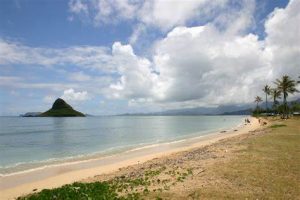
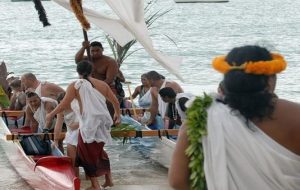 kapa beating were rhythmical signatures of Hawaiian village life. That changed dramatically after Captain James Cook arrived in 1778 and introduced the rest of the world to Hawaii. Cook, who named the islands after the Earl of Sandwich, returned a year later and was killed in a confrontation with Hawaiians at Kealakekua Bay, on Hawaii’s Big Island. Still his impact on the state of Hawaii remains.
kapa beating were rhythmical signatures of Hawaiian village life. That changed dramatically after Captain James Cook arrived in 1778 and introduced the rest of the world to Hawaii. Cook, who named the islands after the Earl of Sandwich, returned a year later and was killed in a confrontation with Hawaiians at Kealakekua Bay, on Hawaii’s Big Island. Still his impact on the state of Hawaii remains.

